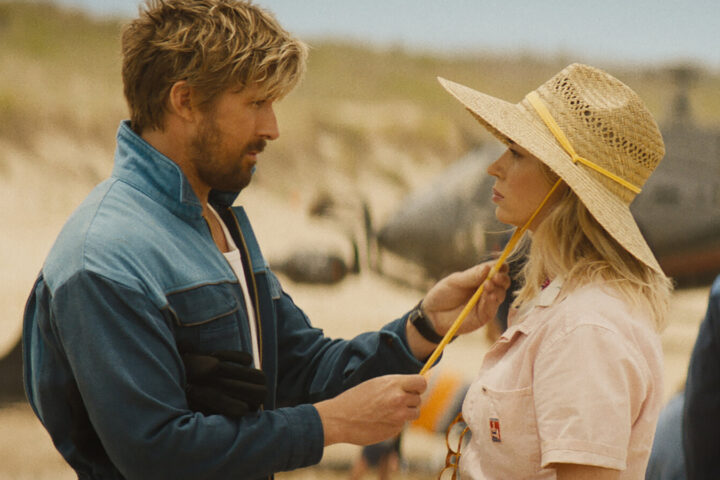“No one in their right mind would do what you do,” journalist Marie Colvin is told late in A Private War, an absorbing character study of a woman who lived, and not always fearlessly, in harm’s way on the front lines of the bloodiest conflicts in recent political history. It’s a biopic that back in the day might have well suited Meryl Streep or Sigourney Weaver, the kind of take-no-prisoners character and milieu built for a star of distinct intellectual and emotional rigor. And boy does Rosamund Pike give it her all.
Picture opens in Syria circa 2012, Colvin (Pike) under fire in the western city of Homs before flashing back to her early days as a correspondent dispatched to Sri Lanka where, in the fog of war with the Tamil Tigers, she loses her left eye but gains her signature eye patch. Why, we wonder, would anyone place themselves this deeply into harm’s way? The movie spends much of its running time seeking to answer this question and understand the combination of bravery, recklessness and an overall volatile disposition that led its subject directly into so many lines of fire.
When she’s not on assignment, Long Island native, London ex-pat and Sunday Times writer Colvin is respected by colleagues and public, and though she shares a contentious relationship with her editor (Tom Hollander), he’s keenly aware that her brand of bravery is, in the newsroom, in short supply. Colvin also carries on a rote sexual fling with her ex (Greg Wise), but her most meaningful relationship is a platonic one with her field photographer, Paul Conroy (Jamie Doran, excellent), who follows her lead into the hot zones, fascinated by her bravado and hard charging ethic.
Scripted by Arash Amel (Grace of Monaco) and based on a Vanity Fair profile by Marie Brenner, the picture presents a sort of family of journalists in crisis, a network of reporters with loyalty to each other’s survival. Theirs is a feverish, die-any-second proposition, Marie driven to expose war’s ugly truths with compassion for its innocent victims. But she’s also a PTSD-suffering, conflict adrenaline junkie, not unlike Jeremy Renner’s Sergeant James in The Hurt Locker or Streep’s Susan Traherne in David Hare’s Plenty, a World War II resistance fighter who found meaning in battle but little on the home front.
Director Matthew Heiman (Cartel Land) mounts a A Private War with its share of gripping scenes and juggles a complex narrative less about the details of the conflicts in which Marie finds herself, which include Libya, Iraq, Afghanistan and her ultimately fateful assignment in Syria, and more about the psyche of a damaged woman who, as we see the traumas unfold, couldn’t possibly live otherwise. Indeed her living in her “normal” life consisted of little more than swigging vodka, chain smoking, fighting nightmares and pursuing relationships of little substance.
As depicted here Colvin finds a moral responsibility to convey the stories of civilians caught up in conflicts—and this takes a severe emotional toll on her, particularly witnessing the deaths of women and children. As both sides in a conflict inevitably lie, she says, she needs to be there to convey the truth of war’s costs, contributing the “rough draft of history.” It’s worth noting that while the film isn’t exactly feminist, it’s hard to imagine a movie about men at war that pauses, as this one does, to so thoroughly examine the faces of those who have lost loved ones, whether hundreds buried in excavated mass graves or toddlers on hospital gurneys. Colvin doesn’t just observe these tragedies, she grieves alongside.
For all its onscreen firepower, the picture’s three best scenes take place outside of battle. The first and most affecting is a rehab confessional where Colvin opens up to Conroy in monologue of frank self-awareness detailing the contradictions of her life—fears of not being able to conceive yet caring for children in the carnage; of going into war but her inability to stay away from it. Another where Colvin interviews Gaddafi (Raad Rawi) takes a surprisingly personal turn after she takes him to task for crimes against his people. And a third scene of flirtation with a new boyfriend, well-played by Stanley Tucci, is an unexpected, welcome respite.
Pike, who largely disappears into her irascibly dogged character, coveys a real haunted soul in Colvin, driven by as much by her compassion for the casualties of war as her own demons of personal unfulfillment. And the actress, often cast as cool, beautiful blondes, more than rises to the occasion (as she did in last year’s period western Hostiles). At times she seems to be so thoroughly relishing Colvin’s contradictions that she can sometimes act up a storm—there’s a broadness to her chain smoking and lower octave vocal appropriation, hallmarks of her real-life counterpart, that borders on theatrical—and such pronouncements can seem at odds with the stark realism of her surroundings.
But this artifice fades any time the star is called upon to deliver emotions, which thunderbolt out of her in a handful of painful encounters with family members of innocents caught in the crossfire. It’s a precise, piercing thing she does, whether before the mirror naked, eye patch intact or lying in the back of a truck storming through heavy artillery.
In a climate where journalists are under fire even in their own American press corps, Marie Colvin sought to dispel the lies that obscure war’s casualties, and stepping into harm’s way was able, in the final analysis, to reveal the lies behind Syrian President Bashar al-Assad’s Homs bombings. The perilous live broadcast of her testimony is only slightly diffused by the presence of Anderson Cooper, running Marie’s live coverage of the civilian death tolls from inside the Homs building where she lost her life.
A Private War is sobering stuff and Pike makes it worth every minute.
3 stars.



